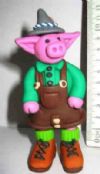|
ESL Forum:
Techniques and methods
in Language Teaching
Games, activities
and teaching ideas
Grammar and
Linguistics
Teaching material
Concerning
worksheets
Concerning
powerpoints
Concerning online
exercises
Make suggestions,
report errors
Ask for help
Message board
|
ESL forum >
Ask for help > help
help
|

rashou

|
help
|
|
today i was telling my pupils about the importance of spelling and how one letter could change the meaning completely and make them sound rude where they meant to be polite and cause them problems with others but could not find an example. could you help with word that become bad words if you just change one letter. thanks |
8 Jan 2015
|
|
|
|

IDIOMAMALAGA

|
|
Hi Rashou, Depending on the age of your pupils, think of variations of between �i � and �e �. Neck and nick are quite harmless for all audiences. Bet and bit, also. Deck and ... well, that would only be suitable for mature students. Hope that helps.
|
8 Jan 2015
|
|
|

Julia45

|
|
These vary in terms of offensiveness, so feel free to choose the ones you like (just imagine how different the words are if you replace the asterisk with different letters): *ART, D*CK, *UNT, SHI*, TI* For more harmless examples, try using KISS vs KILL, LAMP vs RAMP, HIT vs HOT, etc. |
8 Jan 2015
|
|
|

FrauSue

|
|
It might be better to give them some humorous examples rather than rude ones. There were some bottles of bear at the party. (My pupils often mix up beer and bear.) Would you like some chocolate mouse for dessert? (Missing "s") Who are you today? (Instead of "how" - it sounds like you have an identity crisis!) My uncle and ant live in California. (Is he married to an insect? Missing "u".) It was a supper party = We had dinner. / It was a super party = We had a lot of fun. We sang during the voyage = All the passengers were musical. / We sank during the voyage = It was a naval disaster. Slightly rude: "I went to the clothes shop and I bought a new shit" - you can �t forget the "r"! |
8 Jan 2015
|
|
|

Gi2gi

|
|
They are good folk vs They are good f***k (a single vowel matters here) :)) and, of course, i agree that it depends on the level of maturity of your students :) Cheers |
8 Jan 2015
|
|
|

JuliaKaraban

|
|
I agree with FrauSue! You can make some funny sentences yourself using "pan" and "pen"; "deer" and "dear", " sheep" and "ship", etc. |
8 Jan 2015
|
|
|

rashou

|
|
thanks all of you i just want it to be rude but not big words just to make them understand that one letter matters |
8 Jan 2015
|
|
|

douglas

|
|
My favorite example to use in this case is:
"I haven �t seen you in a while. You look really fat have you changed your diet?" (fit)
Cheers,
Douglas |
8 Jan 2015
|
|
|

Minka

|
|
I have a similar problem with pronunciation. My students can �t hear the difference between "leak" and "lick", "this" and "these", so I don �t like using words like sheet, beach etc. I still do, though. And explain them a million times. I can �t remember anything you could use, sorry. I know it happens from time to time that a students writes it �s worm outside, but nothing else. |
8 Jan 2015
|
|
|

mariajosefuster

|
|
I love the video "·The Italian Man who Went to Malta" https://www.youtube.com/watch?v=JAFQFvSPhQ8 https://www.youtube.com/watch?v=YjXGywPzkw0 |
8 Jan 2015
|
|
|

alien boy

|
|
Hi Minka, I often use music/rhythm cues to get students used to English inflection. Japanese is a tonal language, not inflectional, and all the syllables have the same length for sound production, and the pronunciation of doubled vowels (when using romaji) is different to English. I find using rhythm games & singing helps my students learn better inflection. Vocal exercises (as used for singing and drama) can also help with articulation. Cheers, AB |
8 Jan 2015
|
|
1
2
Next >
|